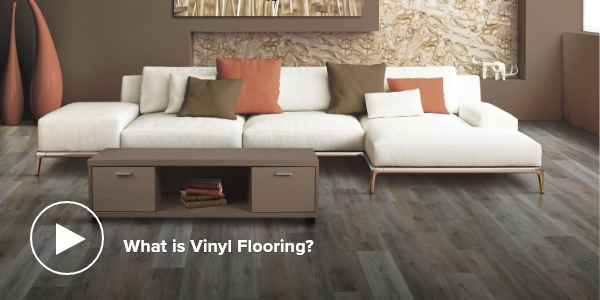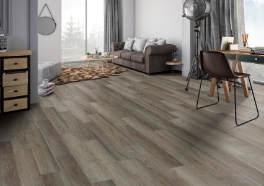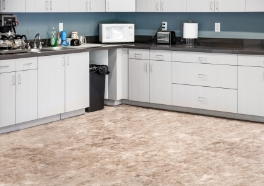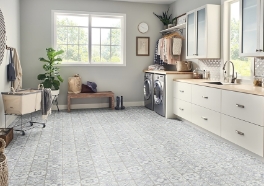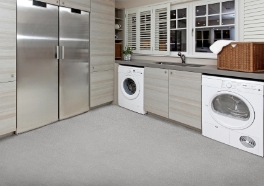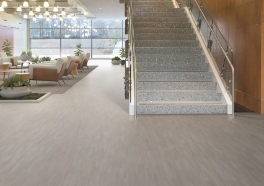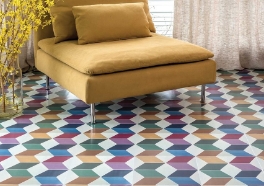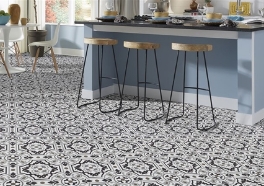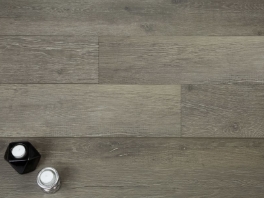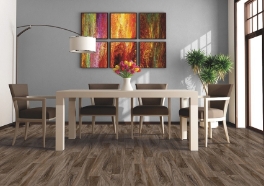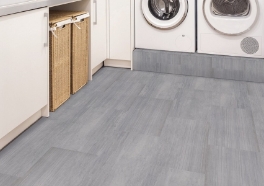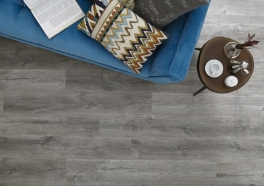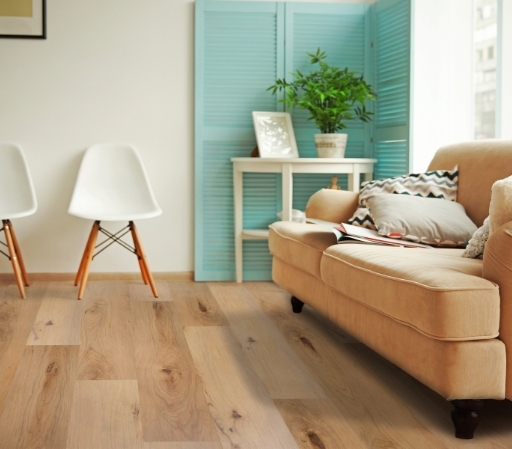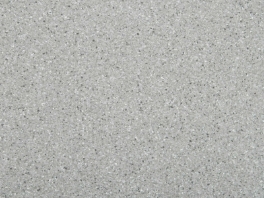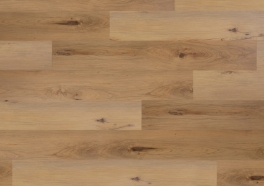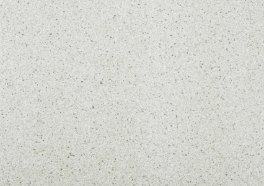Shop Vinyl Flooring
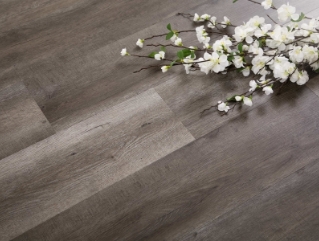
All Vinyl Flooring
- Residential and commercial-grade vinyl
- Family and pet friendly
- Various color, pattern, and texture options
Shop All Vinyl Flooring
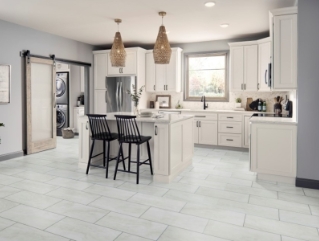
Luxury Vinyl Tile
- Stylish stone, wood, and patterned looks
- 100% waterproof LVT options
- Long-lasting construction
Shop Luxury Vinyl Tile Flooring
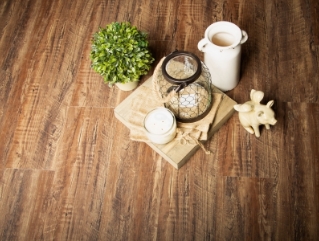
Vinyl Plank Flooring
- Realistic wood and stone looks
- 100% waterproof LVP flooring options
- Easy to install vinyl flooring
Shop Vinyl Plank Flooring
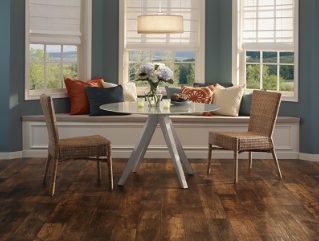
Sheet Vinyl Flooring
- Comfortable underfoot
- Natural and decorative patterns
- Highly water-resistant vinyl sheet options
Shop Sheet Vinyl Flooring
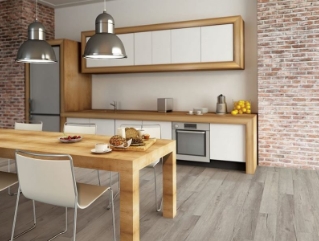
Waterproof Vinyl Flooring
- 100% waterproof WPC and SPC flooring options
- Top-end wood and stone looks
- Lays well over imperfect subfloors
Shop Waterproof Vinyl Flooring
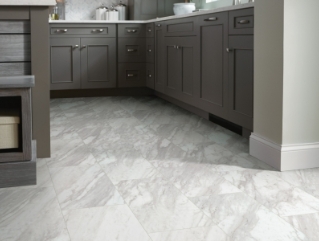
Rigid Core Luxury Vinyl Flooring
- Compatible in high-traffic areas
- 100% waterproof SPC flooring options
- Great for families with kids and pets
Shop Rigid Core Luxury Vinyl Flooring
Customer Favorite Vinyl Flooring
Vinyl Flooring Reviews
Vinyl Flooring FAQs
Vinyl Flooring Overview
As technology advances, vinyl flooring can mimic natural wood and stone looks better than ever before. With minimal maintenance, waterproofing, and a resilient surface, vinyl has become one of the leading flooring choices on the market. Popular places people place vinyl are in entryways, playrooms, bedrooms, kitchens, basements, and more.
Luxury Vinyl Flooring Pros and Cons
Benefits of Vinyl Flooring
- Gorgeous wood and stone looks: Our luxury vinyl planks and tile feature ultra-realistic visuals to suit any room. You’ll have a hard time telling if it’s artificial or not.
- Waterproof options: Many vinyl floors come with waterproof capabilities, making them the perfect choice for kitchens, bathrooms, or anywhere you have moisture challenges.
- Easy-to-clean material: Cleaning is simple with vinyl floors. Sweep regularly and damp mop for deeper cleaning.
- DIY installation options: DIYers, this floor is for you. Several vinyl flooring come with peel-and-stick or click-lock installation to make your project easier.
Disadvantages of Vinyl Flooring
- Difficult to remove: If you choose a more permanent solution, removal will be more challenging to do. It’s best to consider how long you’ll have vinyl floors in one area and the potential foot traffic beforehand.
- Not as eco-friendly: Most vinyl floors are manufactured with safer VOC-free materials and can be repurposed later on. However, it’s best to check the individual product specifications for details.
- Harder to repair: Depending on the vinyl flooring type you choose, it may be harder to repair individual damage spots.
Types of Vinyl Flooring
Vinyl Plank Flooring
Vinyl plank flooring, also known as LVP, can offer an inviting and warm feel to any space. With realistic wood grains and textures like hand-scraped and wire-brushed, you’ll find the perfect look to match your aesthetic.
Shop Vinyl Plank Flooring
Luxury Vinyl Tile Flooring
Achieve beautiful natural stone-look flooring with luxury vinyl tile (LVT). You’ll find a variety of porcelain and ceramic looks, with all the benefits of traditional vinyl material. Compared to natural stone tile, this flooring is a more budget-friendly alternative.
Shop Luxury Vinyl Tile Flooring
Sheet Vinyl Flooring
Homeowners and business owners often use sheet vinyl to cover large spaces. Sheet vinyl tends to be a more affordable option than vinyl planks and tiles when covering more square footage. For commercial projects, vinyl sheets are a leading choice since they’re budget-friendly and easier to install.
Sheet Vinyl Flooring
Applications for Every Space
Residential Vinyl Flooring
Luxury vinyl planks and tiles are often used in residential areas. Homeowners of all lifestyles can benefit from having these durable, beautiful, and affordable floors. In terms of real estate, vinyl flooring is a popular choice when flipping houses.
Shop Residential Vinyl Flooring
Commercial Vinyl Flooring
Commercial vinyl is made to withstand heavy foot traffic and is more scratch- and dent-resistant than residential alternatives. Temperamental spaces like commercial kitchens, restaurants, and grocery stores are places you can find vinyl flooring without worrying about water damage.
Shop Commercial Vinyl Flooring
Vinyl Flooring for Walls
You can use vinyl floor material for more than just floors. Apply vinyl to your walls for a fun, rustic addition to your living room, kitchen, bedroom, or more.
Shop Vinyl Flooring for Walls
Vinyl Flooring Features
Waterproof Vinyl Flooring
If you plan on installing your vinyl flooring in a moisture-prone environment, we recommend going with a 100% waterproof option. Challenging locations like kitchens, laundry rooms, bathrooms, and basements are no longer an issue with 100% waterproof vinyl. Your floors will remain beautiful, dry, and without any damage to the subfloor.
Shop Waterproof Vinyl Flooring
Vinyl Flooring with Attached Underlay
A perk of our vinyl floors is that many come with an attached underlay. Underlayment is an essential part of installing a vinyl floor, as it helps provide comfort underfoot, sound absorption, and insulation. For minor subfloor irregularities, vinyl flooring with attached underlay may be enough to provide a more even surface feel and look. Consult with a professional for individual installation needs.
Shop Vinyl Flooring with Attached Underlay
USA-Made Vinyl Flooring
Love supporting US manufacturers? We have various vinyl tiles, planks, and rolls made and shipped here in the USA.
Shop USA-Made Vinyl Flooring
ADA-Compliant Vinyl Flooring
Having ADA-compliant flooring is essential for wheelchair accessibility. We offer ADA-compliant vinyl planks that are antimicrobial and great for residential and commercial use.
Shop ADA-Compliant Vinyl Flooring
Anti-Microbial Vinyl Flooring
Have concerns about bacteria? Our anti-microbial vinyl flooring prevents bacteria from growing at the plank surface. Anywhere you want a safe surface for children and animals to play with, our anti-microbial vinyl floor options are a trusted option.
Shop Anti-Microbial Vinyl Flooring
Vinyl Flooring Trends
Trending Vinyl Flooring looks
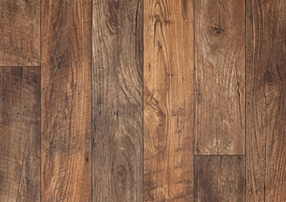
Wood Grain
Wire-brushed and hand-scraped vinyl planks provide just the right amount of intentional scratches to the vinyl to give the trending exposed wood appearance.For an antique look, distressed vinyl plank flooring provides all the scrapes, burns, knots, and wormholes for an aged appearance.
Shop Wood Grain-look Vinyl Flooring
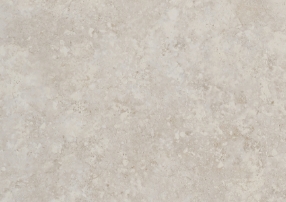
Stone-look Vinyl Flooring
Want to make your space instantly look sophisticated and larger? We’ve got a selection of genuine stone-look vinyl tiles, sheets, and planks to transform any room in your home. Shop Stone-look Vinyl Flooring
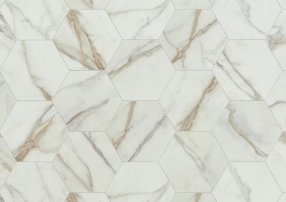
Decorative
If you’re looking for unique and eye-popping patterns, vinyl flooring is a perfect choice. Whether you want flooring to match your contemporary, farm-style, or modern aesthetic, decorative vinyl flooring can pull your look together. Shop Decorative Vinyl Flooring
Trending Vinyl Flooring Colors
Gray Vinyl Flooring
Neutral gray vinyl flooring is a fantastic choice for those who love a low-profile aesthetic. Many contemporary homes feature the gray color within vinyl stone tiles and planks. Gray flooring also provides a neutral backdrop for colorful furniture, decorations, and appliances. You won’t have to worry about clashing tones.
Shop Gray Vinyl Flooring
High Variation Vinyl Flooring
High variation vinyl flooring can give you a bold, multi-dimensional wood look. If you want a natural, rustic look, high-variance vinyl plank flooring provides all the inconsistencies of genuine wood to do just that.
Shop High Variation Vinyl Flooring
Dark Wood Vinyl Flooring
Deep, rich-colored vinyl flooring is a classy way to upgrade your home’s appearance. It’s a popular choice for living rooms and large spaces. In addition, modern farmhouse interiors often use dark wood flooring to offset stark white walls for a bold statement.
Shop Dark Wood Vinyl Flooring
Whitewashed Vinyl Flooring
Whitewashed vinyl is one of the hottest colors to choose from. It compliments a wide range of aesthetics, most popularly used in farmhouse-style kitchens and West Coast-themed interiors. You can achieve a crisp, cool, and relaxed environment with this lighter flooring color.
Shop Whitewashed Vinyl Flooring
Trending Vinyl Flooring Layouts and Patterns
Wide Plank Vinyl FlooringUlta-wide vinyl plank flooring can visually expand any room in your home and provides a less busy look. As the wide plank trend continues to soar in popularity, it may soon become a household classic.
Mixed-Width Vinyl Flooring
Adding planks with different widths to your floor makes your home look modern and unique, drawing attention when you find something unexpected. Mixed-width floor patterns are increasingly popular in contemporary-style homes.
Chevron Vinyl Flooring
Are you searching for a unique floor layout? The chevron pattern creates a seamless zig-zag appearance. DIY installation couldn’t get any easier, as many luxury vinyl tiles now offer the chevron pattern preprinted on the surface.


